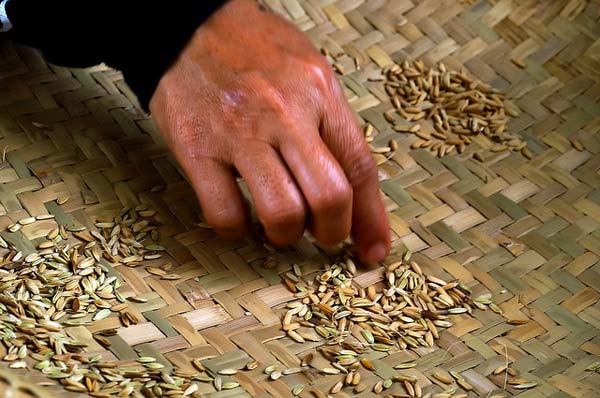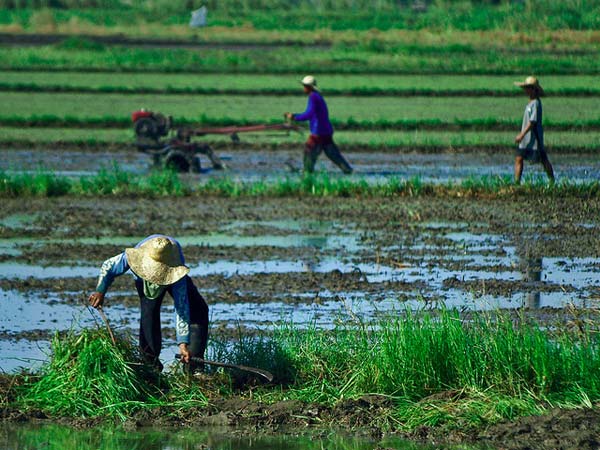Sharing rice
IRRI provides small quantities of rice free of charge on demand to any individual or organization anywhere in the world for the purposes of research, breeding, or training for food and agriculture.
We share the rice seeds stored in our International Rice Genebank according to the International Treaty on Plant Genetic Resources for Food and Agriculture (ITPGRFA). In the past five years, we have distributed 159,815 samples to 1419 recipients in 61 countries. We also gratefully accept contributions of seed to add to our collection.

Obtaining rice from IRRI
STEP 1: Study the Standard Material Transfer Agreement (SMTA) carefully, and verify that you are able to comply with it. You can download the agreement here, consult the official page , or consult our guide on the next section.
STEP 2: Choose the right type of rice
- If you want an accession from the genebank and you already know its accession ID (it has the format "IRGC" followed by a number), use it.
- If you want to choose by searching databases, try these: Genesys for information on accessions held by a number of genebanks including those at IRRI and AfricaRice; IRRI Germplasm Resource Information Network-GLOBAL (IRRI GRIN-Global), and with information on rice held in the genebank.
- If you need help choosing, just send an email giving as much specific detail as possible of what you need, and we will try to help.
STEP 3: Submit your request. Send your request in writing (by email or by fax) or on-line (through IRRI GRIN-Global website or Genesys for genebank collection):
- a statement of the purpose for which you need the material;
- your name;
- the person or organization who should be named as recipient in SMTA and who therefore will be legally responsible for complying with its conditions. If you are employed by an organization and are requesting rice as part of your work, this will normally be your organization; if you are a farmer or anyone else making a personal request, this will normally be you;
- an import permit, if you need one (most countries do--it depends on your country);
- phytosanitary instructions (commonly included with the import permit): what tests or treatments we have to apply and what phytosanity certificate we need to provide;
- shipping address;
- any special shipping instructions you may have;
- a statement that you accept the SMTA;
- if you need the SMTA to be printed and signed, please tell us. Also provide us the name and contact details of the person who will sign on behalf of your organization. However, please be aware that this will delay the process. Normally we follow our faster, less bureaucratic process with an unsigned “shrink-wrap” SMTA (if you don’t know what that means, go back to step 1);
- if you need a non-GMO declaration, please tell us. IRRI takes rigorous precautions to keep transgenic rice separate from non-transgenic rice, and thus ensure that transgenic material does not unintentionally appear in non-transgenic rice. We will issue a declaration to this effect if you ask for it.
Send your request and pertinent documents to:
For germplasm in the International Rice Genebank:
Ms. Marionette Alana
Email: m.alana@irri.org
Fax: +63-2-5805699
Telephone: +63-2-5805600 ext 2308
Standard Material Transfer Agreement
The SMTA is a standard agreement that sets out the terms and conditions under which plant genetic resources for food and agriculture are transferred from one person or organization (“the provider”) to another (“the recipient”) under the multilateral system of the ITPGRFA, (“the Treaty”).
Each use of the SMTA constitutes a contract between the Provider and the Recipient, and is legally binding under normal contract law regardless of their status or what countries they are based in. If you obtain rice from IRRI with an SMTA, the rights and obligations of the Recipient apply to you, while the rights and obligations of the Provider apply to IRRI.
When we send you seed with an SMTA, both you and we must know our respective rights and obligations - what we are permitted to do, what we must do, and what we must not do. The SMTA is a legal contract that defines those rights and obligations, and what will happen if they are not honored. As a legal contract it can be difficult to understand, especially for the average scientist who is not trained in legal matters. However, we still need to understand as best we can what our respective rights and obligations are.
Attribution: This document has evolved from earlier FAQ developed jointly by the System-wide Genetic Resources Programme (SGRP) and legal experts on the Treaty. It also contains answers to other questions raised by and discussed with our collaborators and the same legal experts.
Disclaimer: We cannot provide authoritative answers, and cannot accept responsibility for any errors. In cases of doubt, definitive interpretations can be given only by the Governing Body of the Treaty, through which the text of the SMTA was negotiated, drafted, and finalized.
Our limits
Like everyone, we have our limitations. Here are some things we can and can’t do:
- We are not a commercial seed supplier. But if you’re a farmer willing to spend a season or two growing your own seed, we can give you enough to get started.
- For us, wild rice means the wild species most closely related to cultivated rice.
- We can routinely supply only small quantities of seed, typically just 10g of each cultivated variety or type of rice, more for certain special networks and collaborators, less (10 grains) for wild rice.
- If you want us to send larger quantities, we can do it within limits but only if you are prepared to pay and wait while we produce it.
- We cannot guarantee to provide seed of any specific material. Some materials are temporarily unavailable, as we have to produce more stocks to replace what we've given away or deal with any seed health issues that may arise.
In most cases we cannot give any sort of warranty on the genetic identity of the material provided. Although we conserve seed to the highest possible international standards, it is in the nature of rice to be variable, especially the traditional varieties and wild species, and two samples of supposedly the same variety are often genetically different.
In most cases, we provide seed subject to the Standard Material Transfer Agreement (SMTA) of the Multilateral System of Access and Benefit-Sharing of the International Treaty on Plant Genetic Resources for Food and Agriculture. This includes:
- 123,000 types of cultivated and wild rice securely conserved in the T.T. Chang Genetic Resources Center (GRC) maintained in sufficient quantities to give to you on demand.
- (A variable set of elite lines specially selected each year for further trials to be distributed to our national partners through the International Network for the Genetic Evaluation of Rice (INGER).)
- A further variable set of varieties, elite and promising lines, breeding lines or research materials held by other IRRI scientists, which are not necessarily securely conserved but which we will supply on demand if we have enough seed.
We adhere by all relevant national, international and bilateral agreements and legislation. These include:
- The SMTA sets out a number of rights and obligations of the Provider (us) and Recipient (you).
- Some of the rice we hold is subject to special contractual restrictions that may prohibit us from giving it to you.
- Your country may have laws requiring us to test the health of the seed and certify it with a Phytosanitary Certificate.
- Your country may have laws requiring you to obtain an import permit.

Media
- IRRI donates seeds of high-yielding rice varieties to Typhoon Yolanda-striken areas
- IRRI Pioneer Interview: Seeds and grants—both can be managed in similar ways
You may also view IRRI's video playlist on Rice seeds, germplasm, and varieties.

